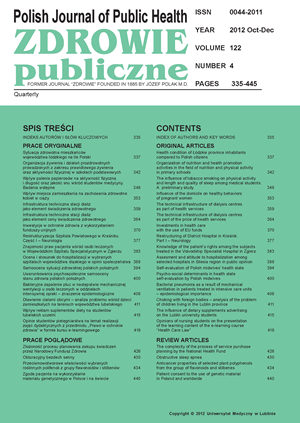Samoocena sytuacji zdrowotnej polskich położnych
DOI:
https://doi.org/10.12923/j.0044-2011/122-4/a.11Słowa kluczowe:
samoocena zdrowia, sytuacja zdrowotna kobiet, położneAbstrakt
Wstęp. Przepisy prawne regulujące pracę położnych przedstawiają je jako osoby zdolne do oceny stanu zdrowia noworodka oraz kobiety.
Cel. Celem pracy jest przedstawienie dokonanej samooceny sytuacji zdrowotnej polskich położnych wraz z uwarunkowaniami tej oceny.
Materiał i metody. Badaniami objęto 3569 położnych z całego obszaru Polski. Materiał badawczy zgromadzono w czasie jednego roku. Dane zebrano metodą sondażu diagnostycznego z wykorzystaniem techniki kwestionariuszowej.
Wyniki. Ponad połowa badanych położnych, niezależnie od regionu kraju (p>0.05), ocenia swoje zdrowie (57.44%), kondycję fizyczną (54.89%) jako dobre. Tylko nieliczne położne przyznają się do złego, a nawet bardzo złego stanu zdrowia (2.72%) i takiej samej kondycji fizycznej (2.63%). W większości położne (63.35%) stwierdzają, że ich stan zdrowia jest porównywalny ze stanem zdrowia innych osób w zbliżonym wieku, a ponad dziesięciokrotnie mniejsza grupa (6.33%) uważa, że zdecydowanie gorsze. Położne oceniające swój stan zdrowia jako bardzo dobry, to przede wszystkim istotnie statystycznie zróżnicowane grupy osób (p<0,001): najmłodszych, poniżej 30 roku życia, stanu wolnego, nie posiadających doświadczenia macierzyńskiego, legitymujących się wykształceniem wyższym, posiadających krótki staż pracy, oceniających bardzo dobrze swoje warunki mieszkaniowe, materialne i jakość swojego życia.
Wnioski. Położne bardzo zadowolone ze stanu swojego zdrowia to najmłodsze panny, nie posiadające dzieci, z wykształceniem wyższym zawodowym o dobrym statusie materialnym, oceniające swoje zdrowie lepiej niż rówieśniczek.
Bibliografia
1. Jabłoński L. Mierniki zdrowia. In: TB. Kulik, I.Wrońska (ed). Zdrowie w medycynie i naukach społecznych. Stalowa Wola: Oficyna Wydawnicza Fundacji Uniwersyteckiej; 2000. p.39-57.
2. Wróblewska W. Women’s health status in Poland in the transition to a market economy. Soc Sci Med. 2002;54:707-26.
3. Kwapisz U, Gryko GB, Majchrzak B, Głogowski J. Zdrowotne i psychospołeczne aspekty funkcjonowania osób w starszym wieku. Pielęgniarstwo XXI wieku. 2005;4:79-82.
4. Jachimowicz V, Kostka T. Health self-assessment among elderly females – students of the University of the Third Age. Ginek Prakt. 2009;17(1):26-30.
5. Bauman K. Jakość życia w okresie późnej dorosłości. Gerontol Pol. 2006;14:165-71.
6. Kaleta D, Polańska K, Dziankowska-Zaborszczyk E et al. Factors influencing self-perception of health status. Cent Eur J Public Health. 2009; 17(3):122-7.
7. Czekirda M, Ślusarska B, Adamska-Kuźmicka I, et al. Satysfakcja z życia kobiet w okresie menopauzy. Fam Med Prim Care Rev. 2007: 9(2):220-8.
8. Wysokiński M, Wrońska I, Fidecki W et al. Samoocena zdrowia fizycznego przez osoby w podeszłym wieku. In: J. Kowalewski, P. Szukalski (ed). Pomyślne starzenie się w świetle nauk o zdrowiu. Łódź: Uniwersytet Łódzki; 2008.p.13-20.
9. Jabłoński L, Wysokińska-Miszczuk J. Podstawy gerontologii i wybrane zagadnienia z geriatrii. Lublin: Wydawnictwo Czelej; 2000.
10. Abramowska-Knom A. Indywidualne demograficzno-społeczne determinanty stanu zdrowia osób starszych – próba kwantyfikacji ich wpływu. In: J. Kowalewski, P. Szukalski (ed). Pomyślne starzenie się w świetle nauk o zdrowiu. Łódź: Uniwersytet Łódzki; 2008.p.206-17.
11. Arber S, Cooper H. Gender and inequalites in health across the lifecourse. In: Annandale E, Hunt K, (ed). Gender inequalites in health. Buckingham: Open University Press; 2000.
12. Khlat M, Serment C, LePape A. Womens health in relation with their family and work roles: France in the early 1990’s. Soc Scie Med. 2000;50:1807-25.
13. Martikainen P. Womens employment, marriage, motherhood and mortality: A test of the multiple role accumulation hypoteses. Soc Sci Med. 1995;40:199-212.
14. Halik J. Samoocena stanu zdrowia ludzi starych. In: J. Halik (ed). Starzy ludzie w Polsce. Warszawa: Instytut Spraw Publicznych; 2004. p.103-6.


